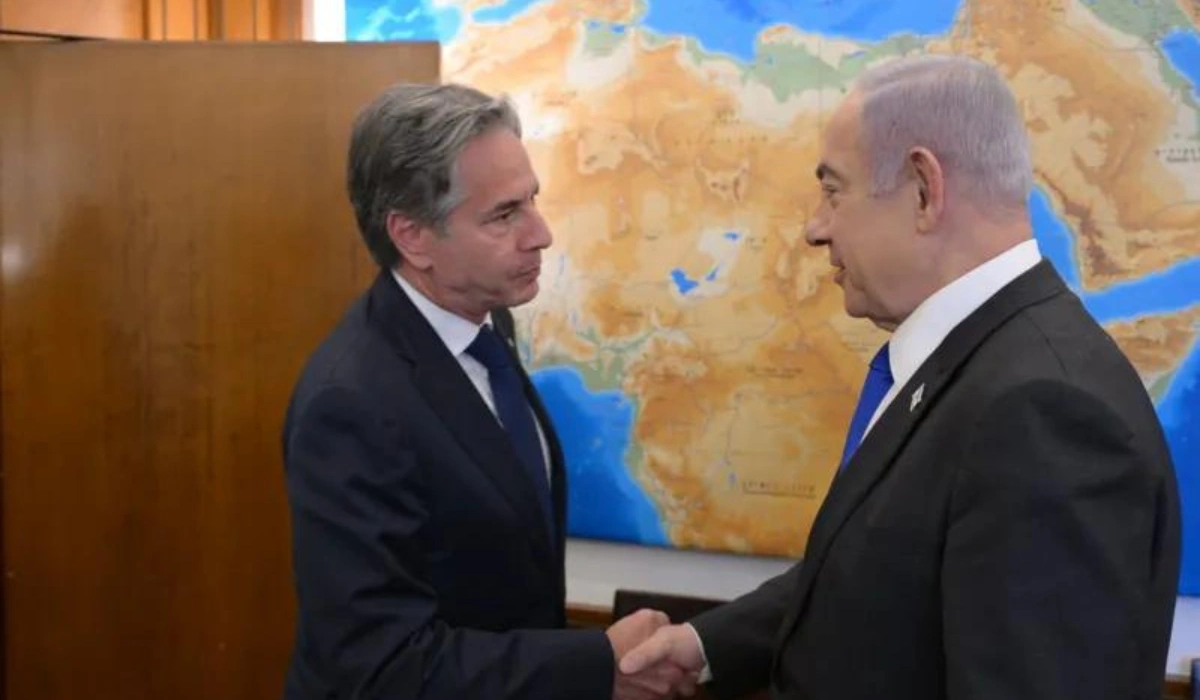US Secretary of State Antony Blinken has arrived in the Middle East on his latest visit, focusing on Washington’s Gaza ceasefire proposal and the future of the Palestinian territory post-war.
On Monday, Blinken met with Egyptian President Abdel Fattah el-Sisi in Cairo, reiterating US demands for Hamas to accept a truce deal proposed by President Joe Biden in late May. Blinken blamed Hamas for prolonging the conflict, calling the group an “outlier” for rejecting the US proposal.
“My message to governments and people throughout the region is clear: if you want a ceasefire, press Hamas to agree,” Blinken told reporters before departing Egypt.
Blinken later arrived in Israel and met with Prime Minister Benjamin Netanyahu. He will continue discussions in Qatar and Jordan later this week.
The State Department reported that Blinken reaffirmed the “ironclad” US commitment to Israel’s security during his meeting with Netanyahu. “The Secretary reiterated that the US and other world leaders support President Biden’s comprehensive proposal, which includes an immediate ceasefire in Gaza, the release of all hostages, and a significant increase in humanitarian assistance across Gaza,” the department said in a statement. Although Blinken presented the truce plan as Biden’s proposal, Biden had previously described it as an Israeli initiative.
The proposal calls for a six-week pause in hostilities, the release of some Israeli captives in Gaza, and Palestinian prisoners in Israeli jails, allowing for negotiations toward a permanent ceasefire.
Despite US officials claiming Israel’s agreement to the proposal, various Israeli leaders, including Netanyahu, have committed to continuing the fight until Hamas is defeated. Days before Biden’s announcement, a senior Israeli official stated that the military would remain in Gaza until at least the end of the year.
Hamas, for its part, has insisted on a deal that ensures a lasting end to the war and a complete withdrawal of Israeli forces from Gaza. On Monday, after a meeting between Hamas leader Ismail Haniyeh and Palestinian Islamic Jihad officials in Doha, Hamas reiterated its stance, stressing that any agreement must include a permanent ceasefire, full withdrawal from Gaza, reconstruction efforts, the end of the siege, and a serious prisoner exchange.
While the Israeli position remains unclear, Biden administration officials continue to assert that Hamas is the “only” obstacle to ending the conflict in Gaza. Blinken expressed uncertainty about Hamas’s willingness to accept the plan and thanked Egypt for its role in the negotiations, noting that Egyptian officials had been in communication with Hamas “just hours ago.”
The US truce plan does not address the future governance of Gaza after the war, but Washington has made it clear that it will not accept Hamas’s rule in the territory. The Biden administration favours a “reformed” Palestinian Authority (PA) to eventually govern Gaza. However, Israel has rejected the idea of allowing the West Bank-based PA to govern Gaza, with Netanyahu comparing Fatah, the PA’s dominant faction, to Hamas.
The Biden administration, which provides Israel with significant military aid, has frequently criticized Israel for its lack of a long-term plan for Gaza beyond the war. “It’s critical that we continue working on plans for the day after, ensuring that security, governance, and reconstruction in Gaza are properly addressed,” Blinken said on Monday. “These will be key topics in my discussions here in the region.”
When asked about an NBC News report regarding a potential unilateral ceasefire deal to secure the release of US citizens held captive in Gaza, Blinken stated that Washington believes a broader truce agreement is the most effective way to secure the release of all captives.
The Egyptian presidency reported that el-Sisi discussed Gaza ceasefire efforts with Blinken, with both sides agreeing to intensify efforts toward a deal. “The meeting also covered Egyptian efforts to deliver humanitarian aid to Gaza, with the president emphasizing the need for international efforts to remove obstacles to this assistance,” it said.
Since October, at least 37,124 people have been killed and 84,712 others wounded in Israel’s war on Gaza, according to Palestinian health officials. Israel has imposed severe restrictions on the supply of food, water, medical supplies, and fuel to Gaza, with the United Nations and aid agencies warning that the territory is nearing famine conditions. Israel launched the war after Hamas led an attack on southern Israel on October 7, killing at least 1,139 people and seizing around 250 others as hostages, according to Al Jazeera’s tally based on Israeli statistics.
About half of the captives were released during a weeklong truce in November. Approximately 120 captives remain in Gaza, including 43 whom Israel has declared dead.


